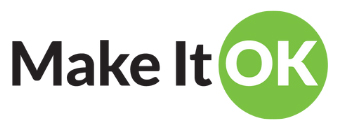
Pandemic-induced burnout and Russia’s unrelenting assault on Ukraine are among the stressors that people working in our diocesan entities struggle with, says Tiara Hatfield, the Diocese of Davenport’s Human Resources and Risk Management director. “The mental and emotional well-being of our employees is something I care about and I know the bishop does, too,” she says. That is why she is grateful for the diocese’s participation in an Employee Assistance Program (EAP).
Catholic Messenger reporter Lindsay Steele, diagnosed with Generalized Anxiety Disorder as a teenager, said the ability to receive mental health care — including through EAP — has enhanced her ability to perform well at work and connect with her coworkers. However, some employees in and outside of the diocese are reluctant to seek help because they mistakenly believe doing so could negatively affect their jobs or their reputations.
The “Make it OK” campaign during May, which is Mental Health Awareness Month, can help all of us to change minds and hearts — including our own — by starting conversations and increasing understanding about mental illness. The Iowa Healthiest State Initiative is leading the campaign in Iowa. Curiously, the campaign, and the public, use the terms “mental health” and “mental illness” interchangeably. Perhaps for some people “mental health issues” carries a lesser stigma than “mental illness” but there is a distinction. The Centers for Disease Control and Prevention states:
“Mental health includes our emotional, psychological, and social well-being. It affects how we think, feel, and act. It also helps determine how we handle stress, relate to others, and make healthy choices. Mental health is important at every stage of life, from childhood and adolescence through adulthood. Although the terms often are used interchangeably, poor mental health and mental illness are not the same. A person can experience poor mental health and not be diagnosed with a mental illness. Likewise, a person diagnosed with a mental illness can experience periods of physical, mental and social well-being.”
NAMI, the National Alliance on Mental Illness, reports, “[N]early 2 in 5 adults struggled with mental health issues in 2020, compared to about 1 in 5 adults before the pandemic. Among adults with mental illness, only 46% received treatment in 2020.” These statistics refer to our loved ones, friends, neighbors, co-workers, parishioners and perhaps ourselves, all of whom represent the demographic landscape of age, race, religion or income. Keep in mind, mental illness is treatable, but support is essential.
Our commitment to educate ourselves about mental illness, to listen to someone struggling with a mental health issue, to pray, and to advocate for services and policies that strengthen mental health and resiliency demonstrates the love that Christ asks of us.
The National Catholic Partnership on Disability (NCPD) states, “Acceptance and socialization in one’s faith community is key to a greater awareness of God’s love. Being an active part of the faith community deepens one’s spirituality and gives hope and support to people who may at times feel disconnected from the community due to a mental illness. If a person feels rejected by their church, they may often feel rejected by God. When a faith community accepts the person for who they are, the faith community reflects God’s unconditional love for all of us.”
“Mental health challenges can be catalysts in our lives that help us grow and thrive,” says Stephanie Burrough, customer service coordinator and community relations specialist with Precedence Inc. — EAP, which the Davenport Diocese uses. “As a community, we must get rid of the stigmas that exist around discussing mental health issues so that those in need of support feel comfortable reaching out when they are in need.”
Here are some helpful tools to reach out to others or to get support for ourselves:
• Make It OK campaign (MakeItOK.org/Iowa).
• Iowa Healthiest State Initiative (iowahealthieststate.com), which provides a plethora of resources and compelling personal testimonies from persons successfully managing their mental illness or who have overcome a mental health challenge.
• National Catholic Partnership on Disability (ncpd.org). The organization’s “Building a Culture of Community: Equipping Leaders for Mental Health Ministry” was scheduled for May 19-21. Email ncpdevents@ncpd.org for follow-up information.
• Precedence Inc. – EAP (Employee Assistance Program) for persons whose employer provides an EAP. Call Stephanie Burrough at (563) 742-2455 or email her at stephanie.burrough@unitypoint.org.
• National Alliance on Mental Illness (NAMI, nami.org). Three NAMI affiliates are located in our diocese:
NAMI Greater Mississippi Valley (coordinator@namigmv.org). Website (namigmv.org).
NAMI Johnson County (mary.issah@namijc.org). Website (namijc.org).
NAMI Southeast Iowa (namisoutheastiowa@gmail.com). Phone: (319) 750-2220.
• Your Life Iowa (yourlifeiowa.org). Provides 24/7 crisis support in Iowa. Call 1 (855) 581-8111 or text to 1-855-895-8398.
• Spiritual practices also bring light to dispel the darkness. Examples include prayer, awareness of God’s presence, random acts of kindness and participation in the sacraments of Eucharist and reconciliation.
“We’re not built to handle the load alone,” says Hatfield. “I turn to my faith first, but God never said trouble would not come. God gave us the avenues to deal with it, such as EAP. I’m here to guide people to the people who can help them.”
Barb Arland-Fye, Editor
arland-fye@davenportdiocese.org











